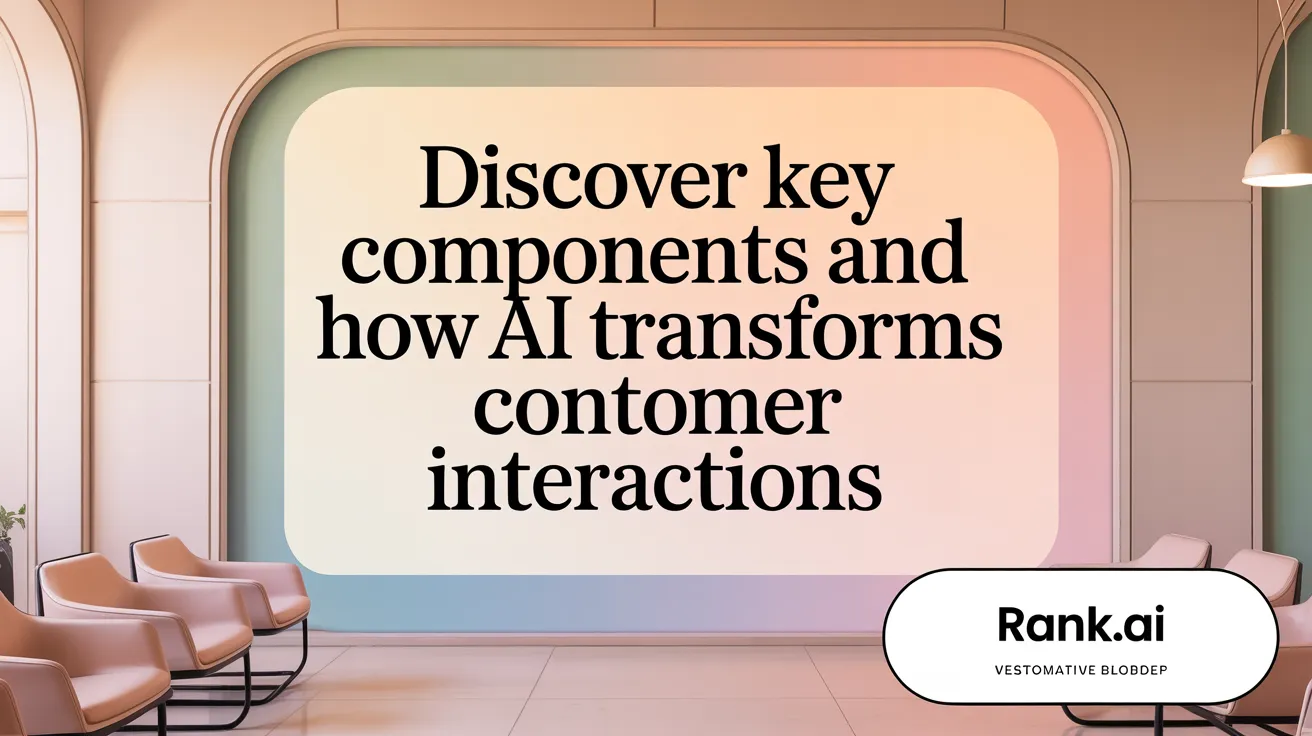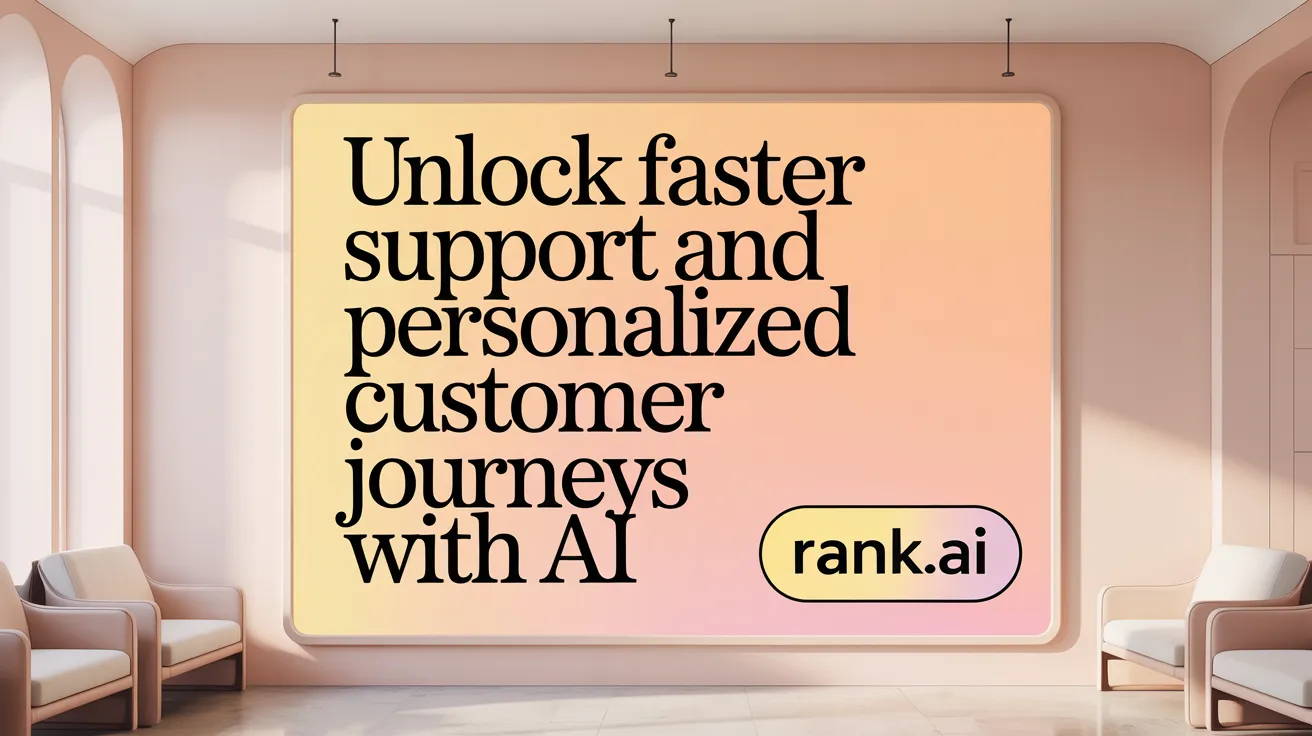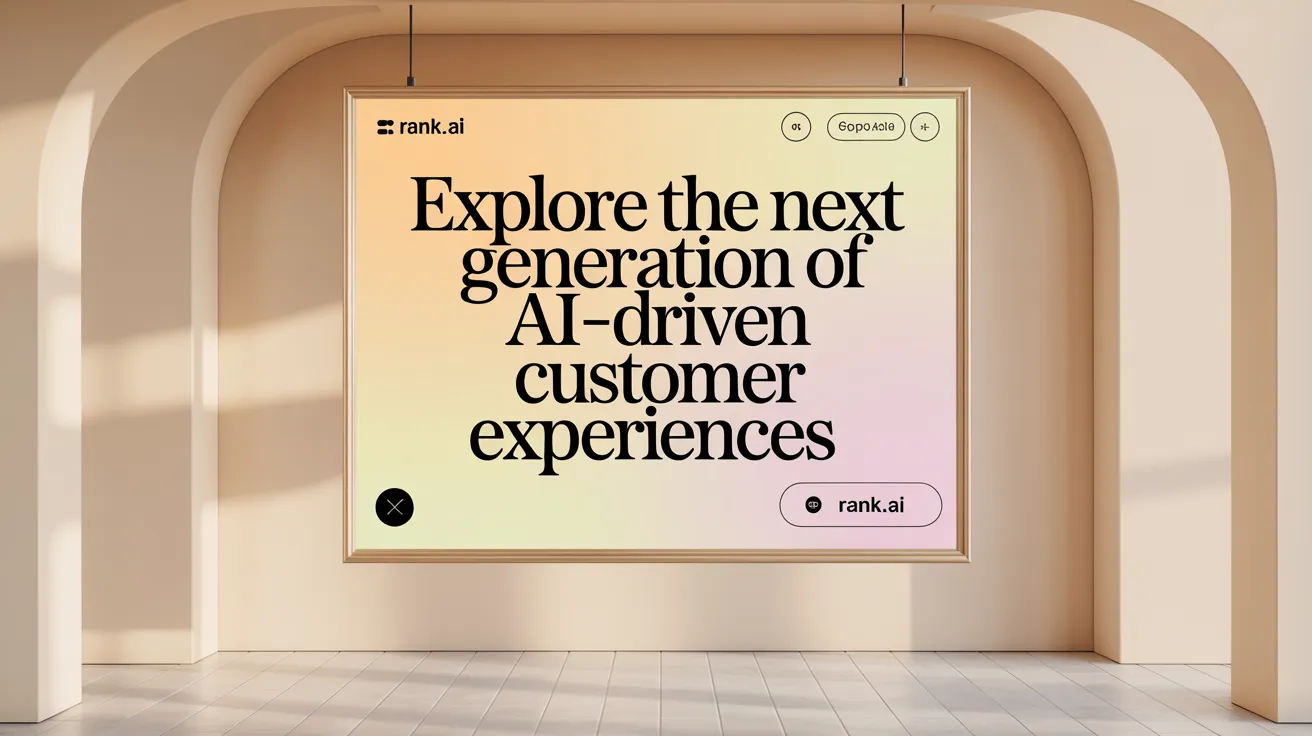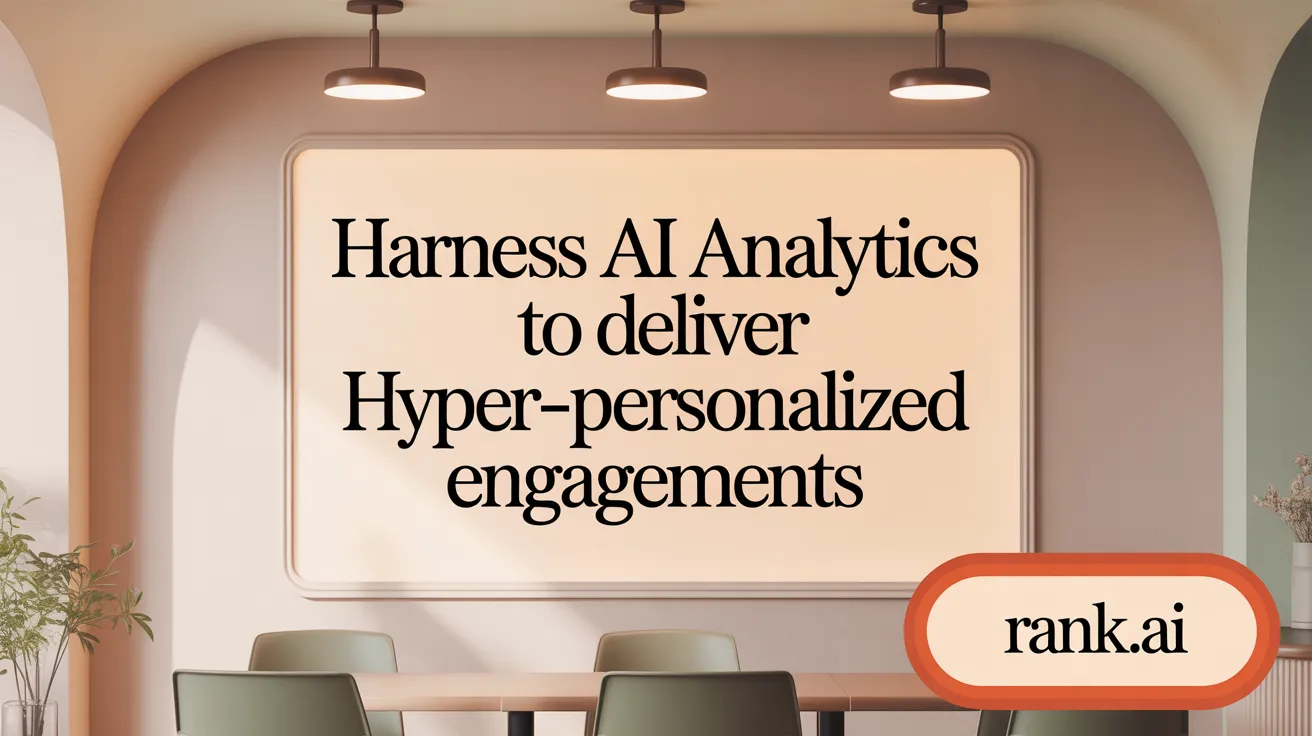The New Era of Customer Engagement
Artificial Intelligence (AI) is reshaping how businesses connect with their customers by automating and personalizing interactions across numerous channels. From chatbots and email marketing to comprehensive CRM platforms, AI automation tools are transforming customer engagement into a smarter, more responsive, and scalable endeavor. This narrative explores the diverse AI technologies enhancing customer engagement, their features, benefits, applications, selection criteria, industry trends, case studies, and future outlook.
Understanding AI Automation Tools for Customer Engagement

What are AI automation tools for enhancing customer engagement?
AI automation tools are technology solutions that leverage artificial intelligence to create more personalized, efficient, and consistent interactions with customers across various platforms. These tools help businesses deliver timely responses, automate routine tasks, and analyze customer behavior to improve overall experience.
Chatbots and virtual assistants are among the most common tools. They can handle inquiries, support onboarding, schedule appointments, and offer 24/7 assistance. For example, Salesforce's Einstein Bots are integrated into their CRM system to provide seamless support.
Predictive analytics and customer relationship management (CRM) systems analyze vast amounts of customer data to forecast behavior, identify engagement opportunities, and personalize marketing efforts. Platforms like HubSpot and Crescendo.ai combine multiple functionalities—tracking customer interactions, analyzing sentiment, and offering actionable insights—all within a unified system.
Social media management tools automate repetitive tasks such as posting updates and engaging with audiences, boosting brand visibility and conversions. Tools like Hootsuite, used by Croda, exemplify how automating social engagement can enhance web conversions.
Overall, these AI-based tools streamline communication, reduce operational costs, and foster deeper connections with customers. They enable businesses to meet customer expectations for rapid, personalized service while managing large-scale interactions efficiently.
What are the main components of AI customer engagement platforms?
AI-driven customer engagement platforms are composed of various interconnected tools designed to work together. These include:
| Component | Function | Example | Purpose |
|---|---|---|---|
| Chatbots | Automate customer interactions | Salesforce Einstein Bots | Support inquiries, onboarding, appointments |
| Email Marketing Tools | Send personalized campaigns | Mailchimp API | Increase engagement via targeted emails |
| Social Media Management | Manage and automate social posts | Hootsuite | Engage audiences, boost conversions |
| Customer Relationship Management (CRM) | Store and analyze customer data | Zoho CRM | Understand preferences, behavior |
| Analytics and Sentiment Analysis | Gain insights from interactions | Crescendo.ai VoC platform | Evaluate customer emotions, issues |
| Omnichannel Platforms | Integrate multiple channels | HubSpot Customer Platform | Provide seamless, consistent experiences |
These components work together to deliver a comprehensive approach to engaging customers through automation, data collection, and analysis. They enhance personalization, help predict customer needs, and enable rapid response across channels.
How do AI tools improve customer engagement?
AI tools support continuous, human-like interactions while reducing the workload on support teams. They allow organizations to respond instantly and accurately, providing a better customer experience.
Sentiment analysis detects customer emotions in real-time, helping agents tailor communications. Predictive analytics forecast future behaviors, making proactive engagement possible. Personalization engines analyze customer data to tailor marketing messages, product recommendations, and service interactions.
Furthermore, AI ensures scalability, supporting growing customer bases without proportional increases in staff. It also reduces costs by automating repetitive tasks like emails, FAQs, and data entry.
By combining these features, businesses can build long-lasting relationships, improve satisfaction levels, and increase loyalty, ultimately driving revenue growth.
Core Features and Functionalities of AI Customer Interaction Tools
What features and functionalities do AI tools offer for customer interactions?
AI-driven customer engagement tools provide an extensive suite of features designed to improve how businesses connect with their customers. One of the foundational technologies used is natural language processing (NLP), which allows machines to understand, interpret, and generate human-like conversations. This capability powers chatbots and virtual assistants that can handle inquiries, support requests, and onboarding processes 24/7.
Sentiment analysis is another vital feature, enabling AI to evaluate customer emotions in real-time. By analyzing language tone and interaction patterns, these tools can determine whether a customer is satisfied, frustrated, or seeking assistance, allowing businesses to respond more empathetically and effectively.
Predictive analytics and behavior tracking form the backbone of personalized customer experiences. These AI functionalities analyze large volumes of data—such as browsing habits, purchase history, and engagement patterns—to forecast future behaviors. This insight enables tailored recommendations, targeted marketing campaigns, and proactive outreach, which help strengthen customer relationships.
Many advanced AI tools incorporate omnichannel support with intelligent chatbots, virtual assistants, and conversation management systems. These platforms seamlessly operate across various communication channels like social media, email, messaging apps, and websites, ensuring consistent and efficient service. For example, platforms like Google Cloud’s Customer Engagement Suite provide omnichannel capabilities that include proactive self-service options and personalized engagement.
Integration with Customer Relationship Management (CRM) systems and data analytics platforms is also fundamental. AI tools can aggregate and analyze customer data stored within CRM systems like Salesforce or Zoho CRM, providing a comprehensive view of customer interactions. This unified approach enables businesses to deliver more relevant content, improve segmentation, and optimize sales and support workflows.
More specialized solutions, such as Crescendo.ai, offer real-time insights into customer pain points by analyzing support interactions across channels. These platforms categorize tickets, generate satisfaction scores, and identify key sentiment trends, helping organizations act swiftly to resolve issues.
In summary, AI customer interaction tools combine natural language understanding, emotional insight, predictive capabilities, omnichannel flexibility, and robust data integration. These features work together to create personalized, efficient, and engaging customer experiences while streamlining operational processes and driving business growth.
Transformative Benefits of AI-Driven Customer Engagement Solutions

What are the benefits of using AI-driven customer engagement solutions?
AI-driven customer engagement tools bring a multitude of advantages that significantly enhance how businesses interact with their customers. One of the most notable benefits is improved response speed and round-the-clock availability. AI-powered chatbots and virtual assistants operate 24/7, instantly handling routine questions and common issues, thereby reducing wait times and ensuring customers always receive support.
Personalization stands at the core of AI-driven engagement. By analyzing extensive customer data, AI systems can predict needs, suggest relevant products or content, and deliver tailored offers on time. This proactive approach not only delights customers but also fosters loyalty and trust, leading to increased retention.
Operational efficiency and cost reduction are key financial benefits. Automation of repetitive tasks such as inquiries, data entry, and appointment scheduling reduces the need for large customer service teams, leading to substantial cost savings. AI tools also enable better routing of complex issues to human agents and provide real-time insights, empowering businesses to make smarter and quicker decisions.
Enhanced customer satisfaction is achieved through AI’s ability to offer consistent, accurate, and personalized support. Advanced sentiment analysis helps understand customer emotions during interactions, allowing companies to address issues more empathetically. AI also assists human agents by offering real-time coaching and suggestions, which improves the overall quality of service.
In summary, integrating AI into customer engagement strategies results in faster responses, personalized experiences, operational savings, and deeper customer relationships. These benefits support scalable growth and help businesses stay competitive in an increasingly digital world.
Key Application Areas: Support, Sales, and Marketing
AI-driven tools are transforming how businesses engage with their customers across support, sales, and marketing. These applications streamline operations, enhance personalization, and enable smarter decision-making.
In customer support, AI tools automate routine inquiries through chatbots and virtual assistants, providing round-the-clock assistance. Salesforce’s Einstein Bots, for example, are integrated into Salesforce CRM to handle support tickets, schedule appointments, and resolve common questions efficiently. AI also analyzes customer sentiment in real-time, helping support teams tailor responses and improve satisfaction. Crescendo.ai’s platform, which categorizes support tickets, identifies pain points, and measures customer satisfaction scores automatically, exemplifies how deep insights are gained from support interactions.
Within sales, AI accelerates the sales cycle by providing predictive analytics, lead scoring, and personalized recommendations. Tools like Gong.io analyze sales conversations for insights, while Customer DNA by Anthropic and Salesforce Einstein suggest next-best actions based on customer behavior. AI helps automate complex processes like RFP responses and discount approvals, making sales teams more agile and responsive. These systems uncover cross-selling and upselling opportunities by predicting customer needs, ultimately increasing revenue.
Marketing efforts benefit significantly from AI through automation and personalization. Campaign platforms like Mailchimp use predictive segmentation to tailor outreach, and HubSpot’s AI-powered chatbots facilitate instant responses and lead capture. AI analyzes browsing patterns, purchasing data, and customer interactions to optimize campaigns in real time, ensuring messages are relevant and timely. Generative AI models assist in rapid content creation, from emails to social media posts, boosting engagement.
To visualize the breadth of AI applications, the table below summarizes how different tools serve these areas:
| Application Area | Functionality | Example Tools | Impact |
|---|---|---|---|
| Customer Support | Automate inquiries, analyze sentiment, gain insights | Salesforce Einstein Bots, Crescendo.ai | Faster resolutions, improved customer satisfaction |
| Sales | Predict customer needs, score leads, recommend actions | Gong.io, Salesforce Einstein, Customer DNA | Increased conversions, revenue growth |
| Marketing | Automate content, personalize campaigns, analyze data | Mailchimp, HubSpot, Adobe Sensei | Higher engagement, better ROI |
Overall, AI's ability to provide data-driven insights, automate tasks, and personalize interactions unlocks significant advantages across customer support, sales, and marketing. This integrated approach fuels more efficient workflows, improves customer experiences, and drives growth.
Selecting the Right AI Platform for Customer Engagement
What criteria should businesses consider when selecting AI platforms for customer engagement?
Choosing the appropriate AI platform requires careful assessment of multiple factors to ensure it aligns with a company’s goals and infrastructure. First, integration and scalability are crucial. The platform must smoothly connect with existing systems such as CRM, email marketing tools, social media management platforms, and support channels, allowing for seamless data flow and unified customer views.
Scalability ensures the platform can handle increasing interaction volumes as the business grows and can support expanding channels. For example, an AI platform should facilitate omnichannel engagement, enabling consistent messaging across websites, mobile apps, social media, chatbots, and email.
Security, privacy, and compliance are non-negotiable. The platform should adhere to data protection laws like GDPR or CCPA, safeguard customer data, and provide transparent privacy policies. This fosters customer trust and avoids legal issues.
The feature set is vital; it should include predictive analytics, sentiment analysis, automation capabilities, and flexible data import/export options. User experience matters for both customers and staff. An intuitive interface, customizable workflows, content creation tools, and robust campaign management features help maximize usability.
Vendor stability and total cost of ownership (TCO) are also important. Businesses need to evaluate the vendor’s market presence, support services, and long-term viability. Understanding the TCO involves not just licensing fees but also implementation, training, maintenance, and potential upgrade costs.
Moreover, the platform’s ability to deliver high message speed and reliability plays a role in customer satisfaction. Ultimately, selecting a platform should align with strategic priorities, ensure future growth, and enhance overall customer engagement efforts.
| Criteria | Considerations | Examples / Further Details |
|---|---|---|
| Integration & Scalability | Compatibility with existing systems, support for multiple channels | CRM, social media, email, chatbots |
| Security & Privacy | Data protection policies, compliance standards | GDPR, CCPA, ISO standards |
| Features & Functionality | Predictive analytics, automation, omnichannel capabilities | Sentiment analysis, predictive lead scoring, content automation |
| User Experience | Ease of use for staff, customer interface | Intuitive dashboards, customizable workflows |
| Vendor Stability & TCO | Vendor reputation, ongoing support, total costs | Long-term viability, licensing, deployment, and maintenance costs |
When weighing these factors, businesses can select an AI engagement platform that not only fits their immediate needs but also adapts to future expansion, ensures data security, and optimizes customer interactions.
Emerging Trends and Insights in AI-Driven Customer Engagement
What are current trends and industry insights related to AI in customer engagement?
The landscape of customer engagement is rapidly evolving with the widespread adoption of artificial intelligence technologies. One notable trend is the increasing use of conversational AI, including chatbots and voice assistants. By 2025, it is projected that AI will autonomously manage up to 70% of customer interactions, drastically reducing wait times and improving efficiency.
Hyper-personalization is another significant development. Driven by advanced analytics, AI enables businesses to deliver real-time, contextually relevant experiences. This tailored approach significantly enhances customer satisfaction and can boost revenue, as up to 80% of consumers now prefer interactions that are personalized.
Emotional AI is also gaining traction. Utilizing sentiment analysis, facial recognition, and voice tone analysis, emotional AI helps companies create empathetic engagements. Implementing these tools can increase customer satisfaction by as much as 50%, fostering deeper emotional connections.
Ensuring a seamless experience across channels remains crucial. AI supports the integration of multiple touchpoints—websites, social media, mobile apps, and call centers—creating consistent, unified interactions that foster loyalty.
Predictive analytics and generative AI further empower organizations to anticipate customer needs and generate relevant content automatically. These innovations allow for proactive support, personalized marketing campaigns, and rapid content creation across various formats.
However, alongside these technological advances, organizations must address ethical considerations. Data privacy, transparency, and responsible AI use are essential to building trust and ensuring compliance with regulations. Successful deployment depends on organizational readiness, including staff training and infrastructure investment.
In summary, current trends highlight a move toward smarter, more empathetic, and integrated AI solutions that transform customer engagement into more meaningful and efficient interactions. These trends are expected to continue shaping the industry landscape through 2024 and beyond.
Real-World Success Stories of AI Enhancing Customer Experience
How have AI tools improved customer experience based on real-world examples?
AI-driven customer engagement tools are transforming how businesses interact with their customers by making experiences faster, more personalized, and more efficient. Several companies across different industries have seen remarkable results after adopting AI solutions.
In the healthcare sector, AI-powered chatbots help patients schedule appointments, answer routine queries, and provide basic health information round-the-clock. These tools reduce wait times and empower patients with immediate support, improving satisfaction and engagement.
The eCommerce industry has benefited from AI through personalized recommendations and virtual assistants that facilitate shopping. For example, many online retailers now use AI to analyze browsing and purchase histories, offering tailored product suggestions, which increases conversions and enhances the shopping experience.
In the SaaS space, AI tools streamline customer support and onboarding processes. Companies like Motel Rocks have utilized Zendesk’s Advanced AI to manage inquiries more effectively, resulting in a 50% reduction in support tickets and higher customer satisfaction scores. Additionally, AI chatbots provide instant responses, handling thousands of customer interactions simultaneously without fatigue.
Camping World integrated IBM’s AI assistant Arvee into their customer service, significantly reducing call wait times. This deployment improved visitor engagement within their digital channels and increased overall customer satisfaction.
Six Flags, the theme park chain, introduced an AI-driven digital concierge via their park app. This virtual assistant improved navigation, facilitated food and merchandise ordering, and provided real-time updates on wait times. Visitors experienced a smoother, more personalized visit, demonstrating how AI can enhance entertainment and leisure activities.
These examples underline the broad impact of AI in automating routine support, personalizing experiences, and providing 24/7 assistance. By analyzing customer sentiment and behaviors, AI tools enable companies to deliver proactive, empathetic, and tailored interactions.
Ultimately, integrating AI into customer engagement processes results in operational efficiencies, reduced support costs, and elevated customer satisfaction—driving loyalty and trust across industries.
The Future of AI Automation in Customer Engagement

What is the future outlook and expected advancements in AI automation for customer engagement?
The future of AI in customer engagement is poised for revolutionary growth driven by significant technological breakthroughs. Generative AI will continue to improve, allowing machines to create highly personalized content, responses, and interactions that feel natural and emotionally resonant. Emotional AI, which can detect and respond to customer sentiments, will enable brands to deliver empathetic support and foster deeper emotional connections.
One of the most exciting developments is the rise of agentic AI, where AI systems become more autonomous. These advanced agents will manage complex tasks independently, from customer onboarding to troubleshooting, reducing the need for human intervention. Their integration with the Internet of Things (IoT) will lead to interconnected experiences, where devices communicate seamlessly to anticipate customer needs proactively.
Innovations such as AI-powered self-service portals, real-time data analysis, and digital twins — virtual replicas of physical assets or customer profiles — will improve responsiveness and personalization. These tools will allow for predictive support, preempting issues before they escalate and tailoring marketing messages to individual preferences.
As these AI capabilities advance, organizations will invest heavily in AI literacy and ethical frameworks to ensure responsible deployment. Privacy and data security will remain paramount, with techniques like federated learning and differential privacy ensuring compliance with evolving regulations.
On the marketing front, hyper-personalization will become standard, with AI analyzing vast datasets to craft hyper-targeted campaigns and generate persuasive, engaging content automatically. This shift will elevate customer experiences from transactional to emotionally engaging.
Overall, these technological strides will lead to higher customer satisfaction, improved operational efficiency, and the emergence of innovative engagement strategies. The ecosystem will evolve into a more human-like, intuitive, and seamless experience, where AI and humans work together to deliver personalized, efficient, and emotionally intelligent customer interactions.
Diverse AI Tools Powering Customer Engagement Ecosystems
Specific AI tool examples and their capabilities
A variety of AI tools are transforming customer engagement by offering specialized functionalities tailored to different needs. Crescendo.ai, for example, leverages advanced analytics to interpret support interactions across chat, voice, email, and SMS. Its platform categorizes support tickets, pinpoints customer pain points, automatically calculates CSAT scores, and analyzes sentiment, providing actionable insights for improving customer experience.
Similarly, CustomGPT.ai stands out with its focus on automating customer support through reliable, multilingual AI responses that prioritize transparency and accuracy. Its no-code deployment makes it accessible for businesses to customize AI-powered interactions, reducing wait times and enhancing personalization.
Gong.io specializes in sales conversation analysis, extracting key insights from calls to improve strategies. Algolia Recommend enhances product suggestions by analyzing customer browsing behaviors, while Persona by Delve AI creates detailed customer personas that inform targeted marketing.
From Crescendo.ai to DevRev and CustomGPT.ai
Crescendo.ai excels in support ticket analysis, offering deep insights into customer issues and sentiment. On the other hand, DevRev provides an AI-native platform emphasizing user experience, automating workflows with features like a generative AI chatbot powered by Turing AI, real-time analytics via their Support360 dashboard, session recordings, and autonomous in-app agents.
CustomGPT.ai complements these tools by empowering businesses to deliver brand-aligned, multilingual responses in real-time, enhancing customer satisfaction and efficiency. These platforms collectively support comprehensive customer engagement, from handling inquiries to delivering personalized experiences.
Comprehensive platforms integrating multiple functionalities
Leading all-in-one solutions like HubSpot’s Customer Platform unify marketing, sales, and service functionalities, leveraging AI to enable real-time chat responses, predictive lead scoring, and extensive analytics. Google Cloud’s Customer Engagement suite offers conversational agents that interpret live media inputs, agent assist features for real-time coaching, and detailed interaction insights, enabling seamless omnichannel customer communication.
These integrated systems demonstrate how combining diverse AI functionalities—such as sentiment analysis, automation, predictive analytics, and personalization—creates a powerful ecosystem that enhances engagement, improves retention, and drives revenue growth.
Leveraging AI for Deep Customer Insights and Personalization

Use of AI for sentiment analysis and Voice of Customer (VoC)
AI tools greatly enhance the understanding of customer emotions and opinions through sentiment analysis. Platforms like Crescendo.ai analyze support interactions such as chat, email, voice, and SMS to gauge customer sentiment in real time. They categorize support tickets, identify common pain points, and calculate Customer Satisfaction (CSAT) scores automatically. This insight helps businesses quickly address issues and improve overall customer experience.
Additionally, Crescendo.ai’s VoC platform provides actionable recommendations based on customer feedback, enabling companies to proactively resolve challenges and improve service quality. Such tools are especially valuable for deep, data-driven insights into customer sentiments, empowering organizations to respond more empathetically and effectively.
Customer behavior analytics and persona generation
AI-driven analytics platforms track customer behaviors across various channels, revealing detailed insights into preferences, purchase patterns, and engagement levels. Tools like Gong.io analyze sales conversations, while Mouseflow records website behavior through heatmaps and session recordings. These insights help build customer personas—detailed profiles that reflect typical behaviors, needs, and motivations.
Persona generation tools, for example, Persona by Delve AI, leverage AI algorithms to create accurate representations of customer types. These personas enable businesses to target marketing efforts more effectively and tailor products or services to meet specific customer needs.
Tailored marketing and hyper-personalized recommendations
AI also powers hyper-personalization by analyzing individual customer data, such as browsing history, purchase behavior, and interaction patterns. Platforms like Algolia Recommend deliver personalized product suggestions, while Mailchimp’s AI features enable predictive segmentation and automated, customized marketing campaigns.
Such tools help companies create tailored marketing messages that resonate with each customer, increasing engagement and loyalty. The ability to deliver timely, relevant recommendations and communications fosters stronger emotional connections and significantly boosts conversion rates.
| Application Area | Main Features | Example Tools | Benefit |
|---|---|---|---|
| Sentiment & VoC | Real-time emotional insights | Crescendo.ai | Better understanding of customer emotions |
| Behavior Analytics | Tracking and analysis of customer actions | Mouseflow, Gong.io | Precise customer profiling |
| Persona Creation | Generating customer profiles | Persona by Delve AI | Enhanced targeting and personalization |
| Personalization | Customized content and recommendations | Algolia Recommend, Mailchimp | Increased engagement and sales |
Leveraging AI for these purposes allows businesses not only to understand their customers better but also to engage them more meaningfully, resulting in improved satisfaction, loyalty, and revenue.
Automation in Customer Support: Enhancing Efficiency and Quality

How AI chatbots reduce workload and wait times
AI-driven chatbots are transforming customer support by providing instant responses to common inquiries. They operate 24/7, ensuring customers receive help anytime, without long waits. For example, tools like CustomGPT.ai incorporate anti-hallucination technology and multilingual support, delivering accurate, real-time answers that ease the load on human agents.
Real-time coaching and escalation support for support agents
Advanced platforms like Crescendo.ai’s VoC system offer real-time insights into customer interactions. They categorize support tickets, analyze sentiment, and assess customer satisfaction scores automatically. This information helps support agents adapt their responses dynamically and know when to escalate complex issues to human specialists, boosting overall service quality.
Automation of ticket triaging and data categorization
Automation tools efficiently classify and prioritize support tickets based on content and urgency. Systems like Zendesk AI and Google Cloud’s Conversational Insights analyze interactions to assign tickets to appropriate teams instantly. This triage process speeds up resolution times, reduces human error, and ensures customers' issues are addressed rapidly.
| Aspect | Tool Examples | Additional Benefits |
|---|---|---|
| Chatbots | CustomGPT.ai, Salesforce Einstein | Reduce workload, handle inquiries 24/7 |
| Real-time support | Crescendo.ai, Zendesk AI | Provide instant insights, support escalation |
| Ticket triaging | Google Cloud Conversational Insights, Help Scout | Faster resolution, improved accuracy |
Implementing AI-supported automation in customer support not only streamlines workflows but also improves customer satisfaction through quicker, more accurate responses. As AI continues to evolve, its role in support teams is set to become even more integral, helping businesses deliver high-quality service at scale.
AI-Driven Marketing Automation and Campaign Optimization
Personalized email campaigns and segmentation
AI-powered email marketing tools help businesses craft targeted messages to specific audience segments, increasing engagement rates. For example, Mailchimp’s API enables automation of personalized email journeys, tailoring content based on customer behavior and preferences. This level of customization ensures that recipients receive relevant offers and information, fostering stronger connections.
Automated social media management and content creation
Social media management platforms utilize AI to automate repetitive tasks such as scheduling posts, managing audiences, and analyzing engagement metrics. Croda’s partnership with Hootsuite exemplifies how automation can boost online presence and conversions. AI can also generate content suggestions and monitor social conversations, helping brands stay responsive and relevant.
Predictive analytics to maximize campaign ROI
Predictive analytics harness machine learning models to forecast customer behavior, identify high-value prospects, and optimize resource allocation. These insights enable marketers to refine their strategies, prioritize leads, and tailor campaigns at scale. Tools like Google Cloud’s AI solutions analyze extensive data sets to determine the most effective actions for increasing sales and customer loyalty.
| Technique | Application | Benefit | Example |
|---|---|---|---|
| Segmentation | Email personalization | Higher engagement | Mailchimp API |
| Content automation | Social media scheduling | Consistent presence | Hootsuite partnership |
| Predictive analytics | Campaign optimization | Increased ROI | Google Cloud AI |
AI-driven marketing automation enhances personalization and efficiency across channels, leading to better customer experiences and improved campaign results. By leveraging data insights and automation tools, businesses can stay competitive and responsive in a dynamic digital landscape.
Balancing Automation with Human Touch in Customer Engagement
Why is maintaining empathy alongside AI automation important?
While AI-driven tools like chatbots and automation platforms significantly enhance efficiency and consistency in customer interactions, they can sometimes lack the personal touch that customers value. Empathy remains a critical element in customer service, especially in resolving complex issues or addressing emotional concerns. Customers are more likely to feel valued and understood when human agents provide personalized responses that acknowledge their feelings.
How can businesses strategically hand off between AI and human agents?
Effective customer engagement involves a seamless transition from automated systems to human support when needed. Many platforms incorporate smart escalation protocols, wherein AI recognizes situations requiring emotional intelligence or nuanced understanding and then transfers the conversation to a human agent. Support tools like Crescendo.ai analyze customer sentiments and provide actionable insights to agents, ensuring timely and relevant engagement.
What are the best practices for ensuring transparency, privacy, and trust?
Transparency about when customers are interacting with AI versus a human is essential for building trust. Clear communication, like informing customers when an AI is handling their inquiry, helps set expectations. Maintaining rigorous data privacy standards and providing customers with control over their data further boosts trust. Regularly updating customers about data security practices and employing secure AI solutions foster long-term confidence.
Balancing automation with the human element ensures that customer support remains empathetic, trustworthy, and effective. By implementing smooth handoff processes, maintaining transparency, and prioritizing privacy, businesses can create positive, personalized customer experiences that leverage the strengths of both AI and human support.
Overcoming Challenges and Adoption Barriers in AI Customer Engagement
Workforce impact and change management
Implementing AI-driven customer engagement tools often involves significant shifts in workforce dynamics. Companies need to train staff to work alongside AI systems, which may replace routine tasks but also require new skills in managing and interpreting AI outputs. Effective change management strategies include providing comprehensive training, clear communication of benefits, and involving employees in the transition process to ensure a smooth adaptation.
Addressing trust, reliability, and bias concerns
A major hurdle in deploying AI tools is building customer and staff trust. Concerns about AI reliability, decision transparency, and potential biases can hinder adoption. To mitigate these issues, organizations should prioritize transparency by explaining how AI systems operate and make decisions. Regular audits for bias, continuous monitoring, and updates help ensure fairness and accuracy. Choosing AI solutions with proven reliability and ethical standards further enhances confidence.
Investment, implementation, and integration hurdles
Adopting AI requires significant investment, not only in technology but also in infrastructure, data security, and human resources. Integration with existing systems like CRMs or marketing platforms can be complex and costly, especially when dealing with legacy systems. Businesses should conduct thorough assessments of their needs, plan phased implementations, leverage trial periods, and work with experienced vendors to minimize disruptions. Successful adoption hinges on aligning AI projects with strategic goals and ensuring seamless integration.
| Challenge Type | Common Solutions | Example Technologies | Additional Notes |
|---|---|---|---|
| Workforce Impact | Training, change management | Support360 Analytics, Support Agents | Focus on employee education and involvement |
| Trust and Reliability | Transparency, bias mitigation | Crescendo.ai VoC, Sentiment Analysis | Regular audits and ethical frameworks |
| Investment & Integration | Phased approach, vendor support | HubSpot, Google Cloud Suite | Careful planning and vendor collaboration |
Overcoming these hurdles is vital for harnessing AI's full potential in customer engagement, ultimately leading to improved customer experiences and business growth.
Harnessing AI to Redefine Customer Engagement
AI automation tools have revolutionized the landscape of customer engagement, empowering businesses to deliver faster, more personalized, and consistent experiences at scale. By integrating advanced technologies such as natural language processing, predictive analytics, and emotional AI across support, sales, and marketing functions, organizations unlock operational efficiencies and deeper customer insights. As AI continues to evolve, balancing automation with human empathy and maintaining ethical standards will be essential to achieving meaningful and lasting connections. Embracing these innovations thoughtfully positions businesses to meet rising customer expectations and thrive in the dynamic digital ecosystem ahead.
References
- Customer Engagement Automation: 5 Tools & Examples
- AI for Customer Insights | 12 Tools for 2025
- Customer engagement software: 12 Must-Try Tools for 2025
- How AI Customer Engagement Transforms ...
- Top 8 AI Tools To Automate Customer Support
- Top AI Customer Engagement Tools to Transform Your ...
- Customer Engagement Suite with Google AI
- Top 10 AI Tools Transforming Customer Engagement ...



